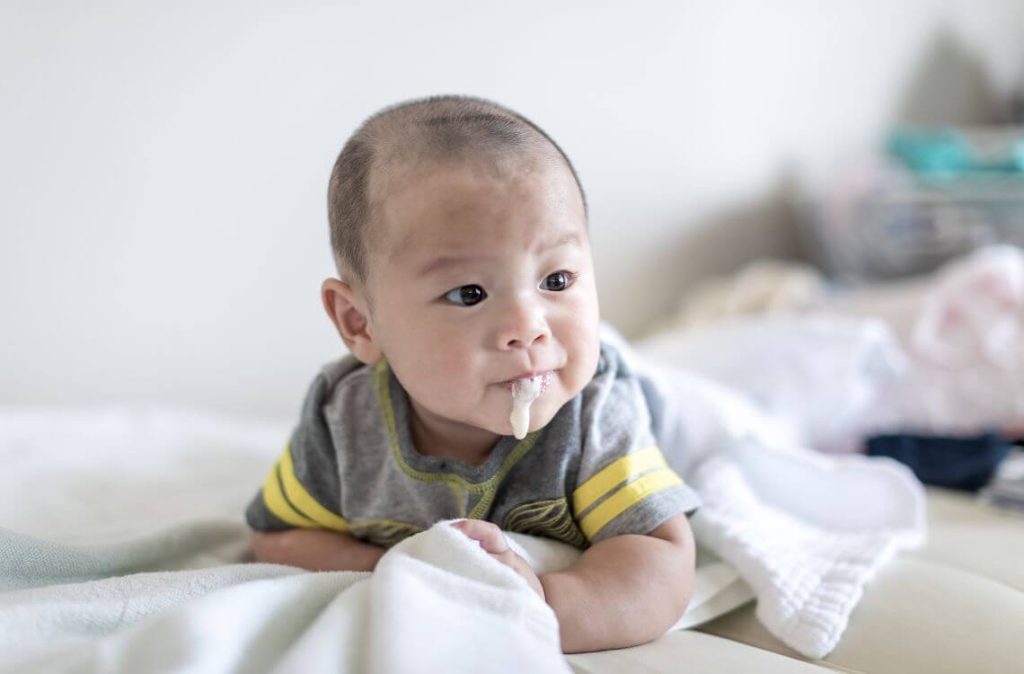Baby spit up is messy business and dealing with it is even more so.
It’s an everyday occurrence, but how much of it is normal and when is it a cause for concern?
Here is how to monitor your baby’s spit up habits.
What is Spit Up
Spitting up is a natural reflex in healthy babies. It is the even flow of stomach content that regurgitates when burping.
It is a mix of milk (formula or breast), saliva and any other stomach contents.
Difference Between Spit Up and Vomit
Baby spit up is natural flow of milk from your baby’s mouth.
They will not jolt or heave when dispelling it.
On the other hand, vomit is more intense.
If milk is coming out with greater force, then it is likely that your baby is vomiting.
Especially if they are experiencing diarrhoea at the same time, there is a possibility they have contracted a virus.
This is when you should contact your paediatrician.
Why Babies Spit Up
Spit up is brought up by the gastroesophageal reflux.
The muscle between the stomach and oesophagus called the lower oesophageal sphincter needs time to mature.
Until then, extra stomach contents will come right back up.
Spitting up happens when the stomach is full. Your baby’s stomach is very small at this stage, so spit up is just a way to get rid of the extra milk.
There are some events that may trigger spitting up. If your baby laughs, cries or burps it can trigger the reflux.
The liquid diet is part of why babies spit up so often.
Both formula and breast milk cause spit up without any variation.
How Much Spit Up is Normal
Amounts of spit up vary between babies. Some will also spit up more often than others.
The best thing to do is monitor the baby spit up to be aware of any abnormalities.
Some indicators of abnormal spit up include:
- pinkish spit up or any colour other than milky white
- forceful spit up
- sudden increase in amounts or frequency of spit up
How to Minimise Spit Up
Here are five ways to reduce baby spit up:
Avoid Overfeeding
Babies have smaller stomachs and get full easily.
This is especially common in bottle fed babies where parents would prefer to drain the bottle.
Breast fed babies are fed based more on intuition and their hunger levels.
Feeding smaller volumes at shorter intervals may be time consuming but is ultimately worth it.
Hold Baby Upright
For about 30 minutes after feeding, hold your baby upright to reduce chances of spit up.
Holding or carrying them to your chest as you go about your business is an easy way to do this.
Burping
Burping babies specifically during and after feeds can help reduce spit-up.
Take the time to release built up gas so their stomachs are emptier and can handle larger amount of food.
Limit Post-Feeding Activity
Too much activity right after meals can trigger the reflux and cause spit up earlier than you might hope.
So, limit their activity to at least an hour after meals.
Use a Slow-Flow Nipple
Using a slow-flow nipple reduces the amount of air baby takes in while eating, allowing more space in the stomach for food.
It also reduces burping later on and eases digestion.
When Babies Will Stop Spitting Up
Babies spit up frequently until they are at least three months old.
It may lessen after that, but will happen fairly often until the 12-month mark.
Once their digestive tracts mature, baby spit up will decrease greatly.
It may still happen from time to time even after they turn a year old, which is normal as long as it is not excessive.
As long as you do not notice any abnormalities there is no need to consult your doctor.
However, if your baby suddenly spits up a large amount after a long time, make sure to inform them.
What Comes Next
Baby spit up is a normal part of babyhood and should not cause you any worry.
It will be over soon enough and the clean ups will get easier, so sit back and let your baby do their thing.
You’ve got this, parents!
For more insightful stories and fun recipes, stay tuned to Motherhood Story!
